This comprehensive guide shows you exactly how to apply to Canadian university as an international student. Whether you’re still in high school or preparing for college, you’ll learn everything from choosing the right program to securing your study permit—step by step.
Introduction: Why Study in Canada?
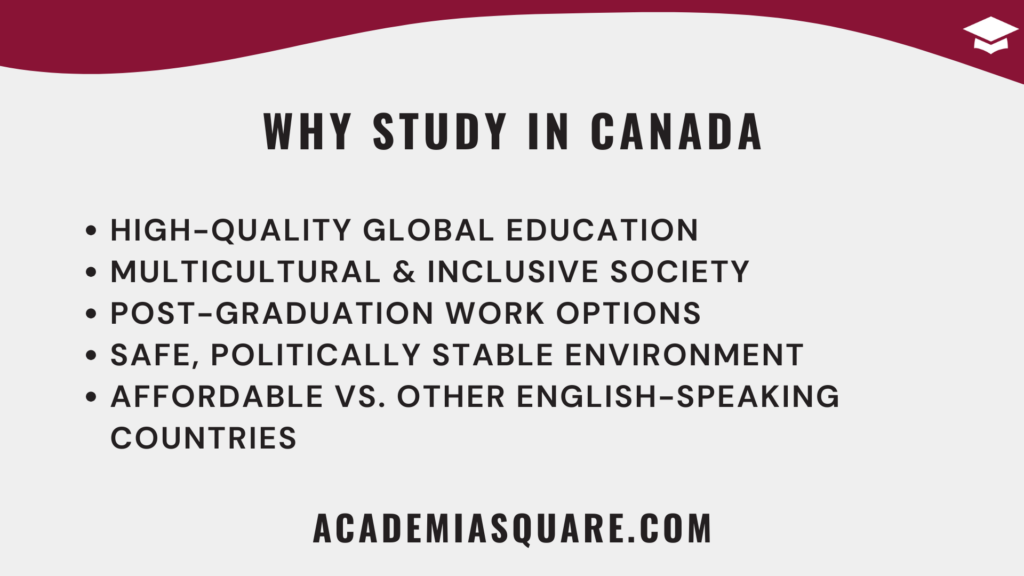
Choosing to study abroad is a life-changing decision, and Canada has become one of the top destinations for international students from around the world. With its world-renowned education system, diverse society, and safe living environment, it offers a powerful combination of academic excellence and cultural experience. This chapter will explore why applying to Canadian universities as an international student is not only a viable option—but a smart one.
Why Canada Attracts International Students
Canada ranks consistently among the top countries for education and quality of life. According to the OECD, Canada has one of the highest rates of tertiary education attainment globally. Its institutions are known for research output, innovation, and teaching quality. These factors contribute to the rising number of international applications to Canadian universities every year.
In addition, Canada is known for its multicultural inclusivity. Over 250 ethnic origins were reported in the most recent Canadian census, making the country a vibrant mosaic of cultures. International students often find it easier to adapt and feel welcomed, which is essential for academic and personal success abroad.
Benefits of Studying in a Canadian University
When you apply to a Canadian university as an international student, you’re not just signing up for classes—you’re investing in your future. Canadian credentials are globally respected and can open doors to postgraduate opportunities both in Canada and internationally.
Here are some standout benefits:
- High-quality education: Canadian universities often rank among the top 100 globally.
- Affordable tuition: Compared to the U.S. and U.K., Canadian universities offer a better balance of cost and quality.
- Work opportunities: International students can work up to 20 hours per week during semesters and full-time during breaks.
- Post-Graduation Work Permit (PGWP): This allows graduates to stay and work in Canada for up to three years.
- Pathway to permanent residency: Programs like the Canadian Experience Class (CEC) make it easier for graduates to stay permanently.
Educational Landscape for International Students in Canada
Canada is home to more than 100 public and private universities, each offering a range of undergraduate, graduate, and doctoral programs. The most popular provinces for international students are Ontario, British Columbia, and Quebec, due to their strong academic institutions and support services for newcomers.
Here’s a quick look at what Canadian higher education offers:
- Research-driven programs: Ideal for students interested in science, technology, engineering, and health sciences.
- Co-op and internship opportunities: Built into many programs, helping students gain real-world experience.
- Flexible curriculum: Many institutions offer interdisciplinary courses and minors to tailor your education.
How International Students Are Supported
Universities in Canada recognize the unique challenges faced by international applicants. That’s why they offer dedicated support services ranging from academic tutoring and language assistance to career counseling and immigration help. Organizations like the Canadian Bureau for International Education (CBIE) also offer valuable resources to guide students through the application and integration process.
Moreover, most campuses have international student offices staffed with advisors who can help you navigate everything from visa questions to housing options. Many also run orientation programs, mentorship initiatives, and social clubs to help students feel at home.
Why Now Is the Right Time to Apply to Canadian University as an International Student
In the post-pandemic academic landscape, Canada continues to show strong support for international students. The government has adapted policies to facilitate online and hybrid learning, and IRCC (Immigration, Refugees and Citizenship Canada) has introduced measures to speed up visa processing for eligible candidates.
With increasing global competition, making an early and well-informed decision to apply to Canadian university as an international student can significantly enhance your educational and career trajectory. This guide will walk you through every aspect of the process—from understanding requirements to planning financially—ensuring you’re equipped to make the best choice for your future.
Understanding the Canadian Education System
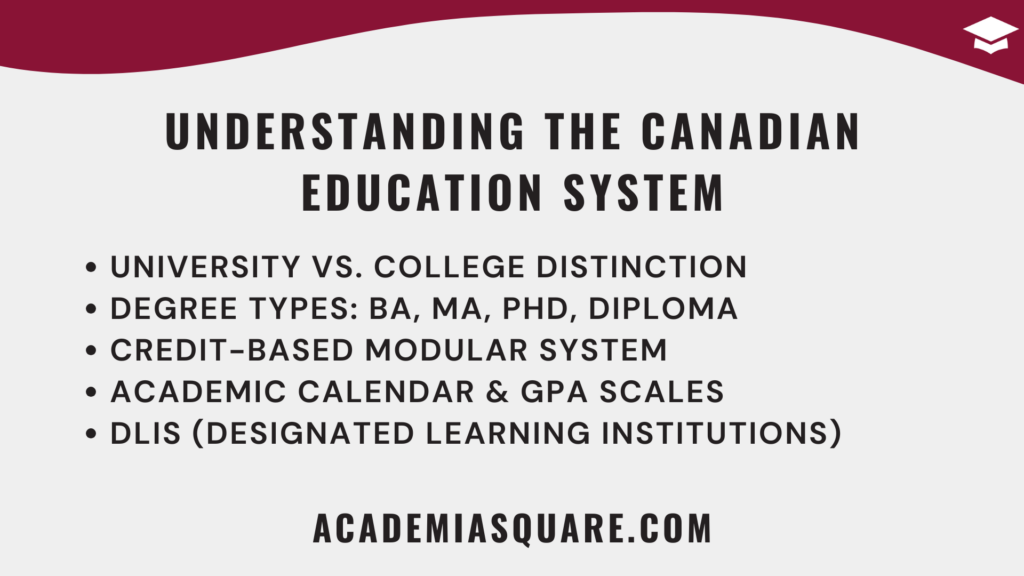
Before you apply to a Canadian university as an international student, it’s crucial to understand the structure and expectations of the Canadian education system. Canada offers a flexible, high-quality academic environment that can differ significantly from other countries in terms of terminology, duration, and institutional types.
University vs. College: What’s the Difference?
In Canada, “college” and “university” are not interchangeable terms. Unlike in the U.S., where both can mean degree-granting institutions, in Canada they serve different purposes.
- Universities offer academic and professional degree programs, including undergraduate (Bachelor’s), Master’s, and Ph.D. programs.
- Colleges (also known as community or technical colleges) focus on practical, skills-based training and offer diplomas, certificates, and associate degrees.
Both types of institutions welcome international students, and some students even choose to attend a college first and then transfer to a university.
Degree Levels and Structure
Canadian post-secondary education consists of three primary levels:
- Undergraduate degrees: Typically last three to four years (Bachelor’s degrees).
- Graduate degrees: Include Master’s programs (1–2 years) and Doctoral programs (usually 3–6 years).
- Diplomas and certificates: Offered mostly by colleges, lasting from a few months to two years.
Each program is made up of a series of credit courses. You need to complete a certain number of credits to graduate, and programs often allow students to choose electives or minors to tailor their education.
Academic Calendar and Grading System
Most universities in Canada operate on a semester or trimester system:
- Fall term: September to December
- Winter term: January to April
- Optional summer term: May to August
Grades are typically given as letters (A, B, C, etc.) and sometimes converted into a 4.0 GPA scale. The passing grade and GPA requirements vary by institution and program.
Designated Learning Institutions (DLIs)
To apply to Canadian university as an international student, you must choose a Designated Learning Institution (DLI). Only these institutions are approved by the government to host international students. Applying to a non-DLI will disqualify you from receiving a study permit.
You can find a list of DLIs on the official Immigration, Refugees and Citizenship Canada (IRCC) website.
Language of Instruction
Canada is officially bilingual, with English and French as its two official languages. Most institutions outside Quebec teach in English, while Quebec offers both English and French institutions. Some programs are also bilingual, providing students with the opportunity to study in both languages.
Understanding this structure ensures that you select the right type of institution and program that aligns with your academic and career goals.
Choosing the Right Program and Institution
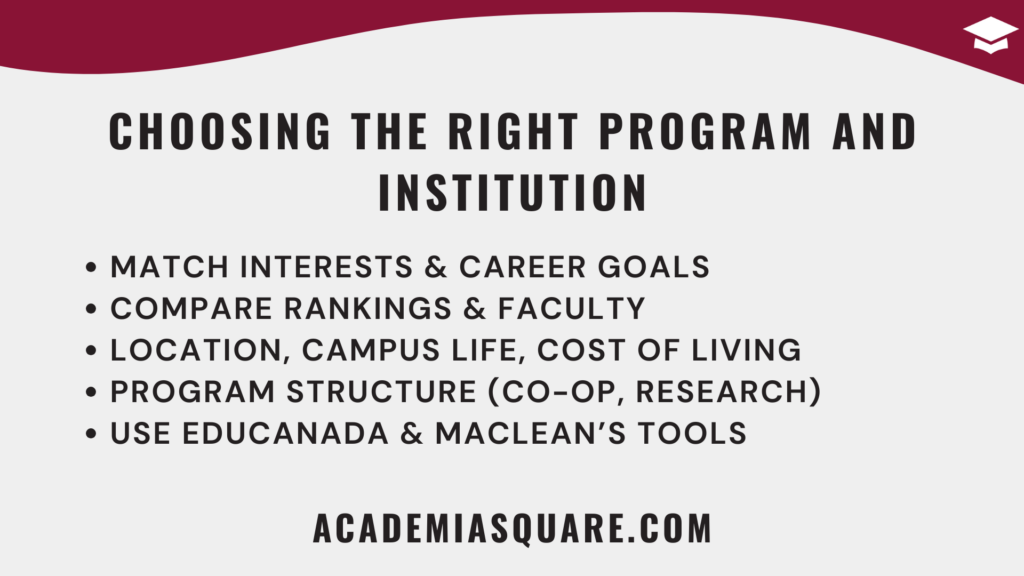
Finding the best fit is one of the most important steps when you apply to Canadian university as an international student. Your choice of program and institution can shape your academic experience, influence your future career path, and even affect your chances of immigration.
Factors to Consider When Choosing a Program
It’s essential to evaluate not just the program content, but how it aligns with your future goals. Consider:
- Field of interest: Are you passionate about the subject? Will it lead to your desired career?
- Program duration and structure: Does the format suit your learning style? Is co-op included?
- Accreditation: Will your degree be recognized in your home country or where you plan to work?
Review the course curriculum carefully. Some programs offer specializations, minors, or electives that allow you to tailor your education.
How to Compare Universities
Not all universities are created equal, and the “best” university for one student may not be the best for another. Consider these criteria:
- Reputation and rankings: Global rankings can be a starting point, but they don’t tell the full story.
- Location: Urban vs. rural settings, climate, cost of living, and lifestyle can all impact your experience.
- Support services: Look for schools that offer strong support for international students.
Using Search Tools and Databases
Several resources can help you compare programs and institutions, such as:
- EduCanada: Official Canadian government portal
- Maclean’s University Rankings
- QS World University Rankings
These tools allow you to filter by program, location, tuition, and more.
Application Fit: Reach, Match, and Safety Schools
Strategically applying to a mix of institutions improves your chances of admission. A good approach includes:
- Reach schools: Competitive programs where your academic profile is slightly below average.
- Match schools: Schools where your qualifications align with the average admitted student.
- Safety schools: Schools where you exceed the admission criteria.
Taking the time to compare and reflect on your goals ensures you’ll apply to institutions that support your long-term ambitions.
Admission Requirements for International Students
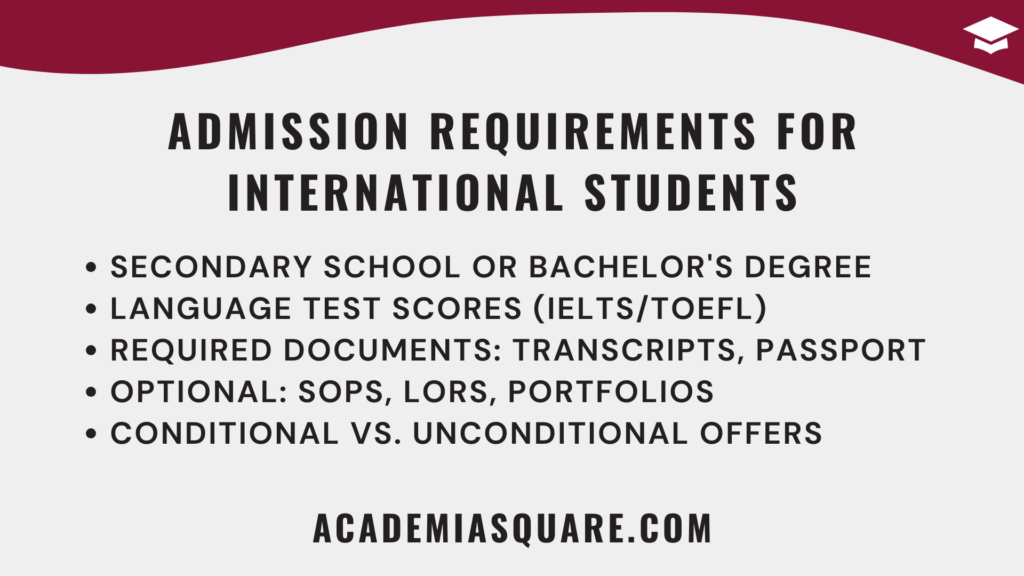
Understanding the admission requirements is vital before you apply to Canadian university as an international student. Requirements vary between universities and programs, but there are common elements that all international applicants should prepare for in advance.
Academic Requirements for Canadian Universities
Canadian universities generally evaluate applicants based on secondary school results or prior university transcripts. Each institution sets its own thresholds, but here are the typical elements reviewed:
- GPA or equivalent academic scores from your home country.
- Completion of specific prerequisite subjects (e.g., math or science courses for STEM programs).
- Proof of graduation or expected graduation before enrollment.
Advanced coursework such as A-Levels, IB Diploma, or Advanced Placement (AP) may also be considered for credit or advanced standing.
Language Proficiency Requirements
Most Canadian universities require proof of English (or French) language proficiency. Accepted test scores include:
- IELTS: Usually 6.5 overall with no band below 6.0.
- TOEFL iBT: Generally 80–100, depending on the institution.
- CAEL, Duolingo English Test, PTE: Accepted by some universities as alternatives.
For French-language programs, tests like TCF or TEF may be required.
Required Documents for Application
Though specifics vary, most applications to Canadian universities require:
- Academic transcripts and translated copies if not in English or French
- Proof of language proficiency
- Letters of recommendation (optional for undergraduate programs but common for graduate studies)
- Personal statement or statement of intent
- Copy of passport
Make sure documents are certified and submitted before the stated deadlines.
Understanding Conditional and Unconditional Offers
You may receive a conditional offer of admission based on predicted grades or pending language scores. Once conditions are met (e.g., you pass your final exams), your offer becomes unconditional.
Understanding these distinctions will help you make informed choices and prepare for what comes next in your application journey.
How to Apply to Canadian University as an International Student
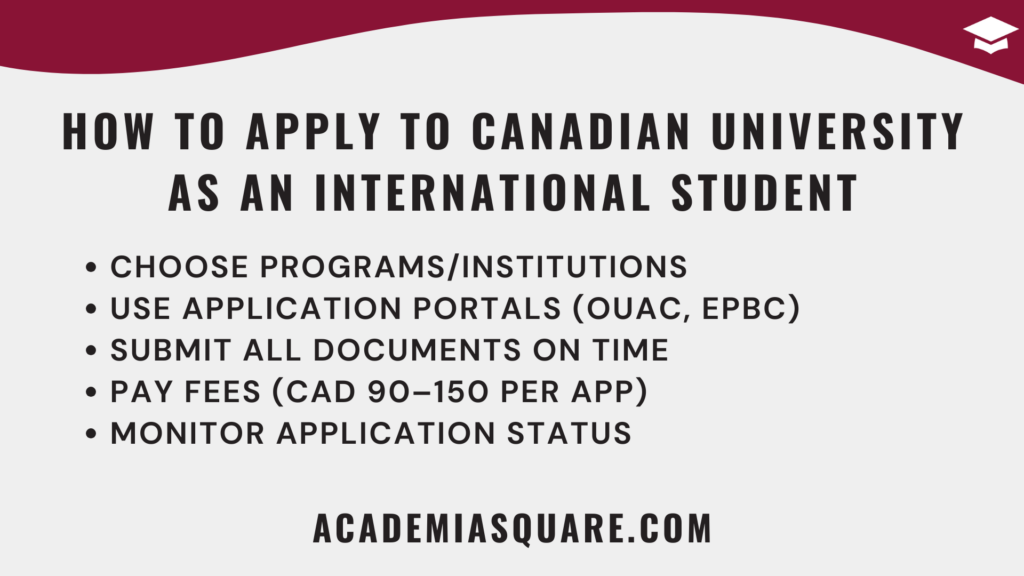
Once you’ve chosen the right university and program, the next step is to learn exactly how to apply to Canadian university as an international student. The process can seem overwhelming, but when broken down into steps, it becomes manageable. This chapter covers everything you need to know to submit a strong and complete application.
Step-by-Step Application Process
Each university may have its own specific requirements and platforms, but most applications follow this general process:
- Create an account on the application portal: This could be a provincial portal (e.g., OUAC for Ontario) or the university’s own system.
- Fill out personal and academic information: Ensure all details match your official documents.
- Select your program(s): You may apply to multiple programs at one or more institutions.
- Upload required documents: This includes transcripts, language test scores, and more.
- Pay the application fee: Typically ranges from CAD 90 to CAD 150 per application.
- Submit before the deadline: Late submissions are often not accepted for international applicants.
Some provinces, like Ontario and British Columbia, offer centralized portals, while others may require direct applications to individual universities.
Key Application Portals
Depending on where you are applying, here are some major application systems:
- OUAC – Ontario Universities’ Application Centre
- EducationPlannerBC – For British Columbia institutions
- Institution-specific portals (e.g., McGill, University of Alberta)
Deadlines and Intake Periods
Canada typically offers three intakes for international students:
- Fall (September): Main intake with the most programs open
- Winter (January): Secondary intake with limited program options
- Summer (May): Fewer programs, often focused on short-term courses
Application deadlines are usually between December and March for fall intake. Check each university’s website for exact dates.
Tips to Strengthen Your Application
A well-prepared application increases your chances of admission. Here are key strategies:
- Write a clear, genuine personal statement: Tailor it to the specific program and explain your goals.
- Meet or exceed language requirements: Higher scores can enhance competitiveness.
- Provide strong academic references: If required, choose referees who know your work well.
Applying early and paying attention to details gives you a competitive edge in the highly selective Canadian admission process.
Understanding Study Permits and Visa Requirements
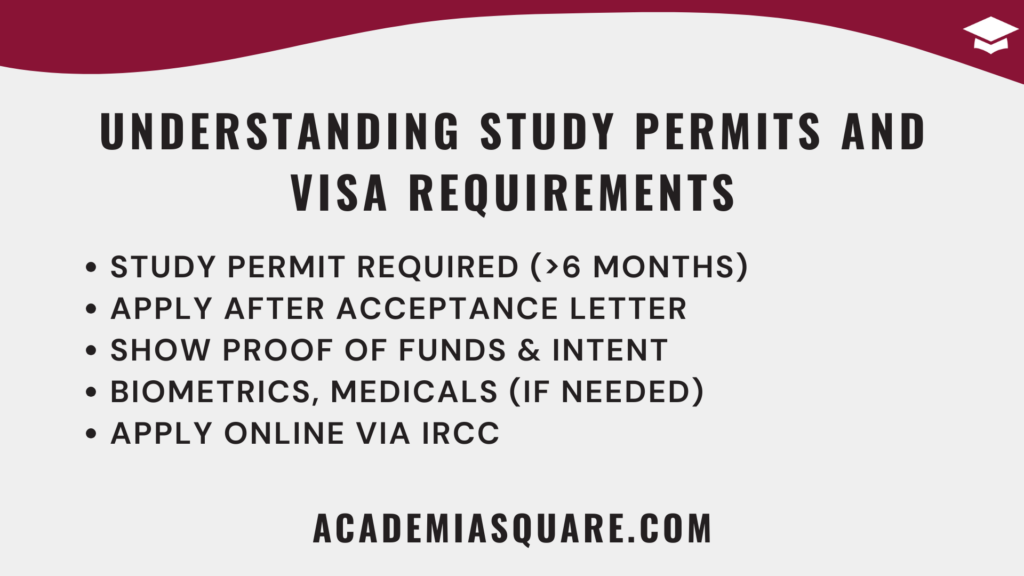
After you receive your letter of acceptance, the next step to study in Canada is applying for a study permit. This legal document issued by Immigration, Refugees and Citizenship Canada (IRCC) allows you to live and study in Canada as an international student. Without a study permit, you cannot legally attend most Canadian universities.
Eligibility Requirements for a Study Permit
To be eligible for a Canadian study permit, you must:
- Have an acceptance letter from a Designated Learning Institution (DLI)
- Prove you have enough money to pay for tuition, living expenses, and return transportation
- Have no criminal record and be in good health
- Demonstrate intent to leave Canada at the end of your studies (unless applying for PR later)
Financial proof typically requires bank statements, scholarships, or a letter of financial support.
Documents Needed for a Study Permit Application
You’ll need to submit several documents through the IRCC portal:
- Letter of Acceptance from a DLI
- Proof of funds (bank statements, scholarship letters, etc.)
- Valid passport and passport-sized photos
- Statement of purpose (why you want to study in Canada)
- Police certificate and medical exam results (if requested)
All documents not in English or French must be translated and notarized.
Applying for the Study Permit
You can apply online via the IRCC website. In some countries, paper applications or visa application centers (VACs) may also be an option.
Processing times vary by country, ranging from a few weeks to several months. Check current estimates on the IRCC site and apply as early as possible.
Biometrics and Interviews
Most applicants are required to give biometrics (fingerprints and a photo) at a Visa Application Centre. In rare cases, an interview may be requested. Pay attention to communication from IRCC after submission.
Having a valid study permit is crucial to entering Canada legally and accessing student benefits like work rights and healthcare (in some provinces).
Financial Planning: Tuition Fees and Scholarships
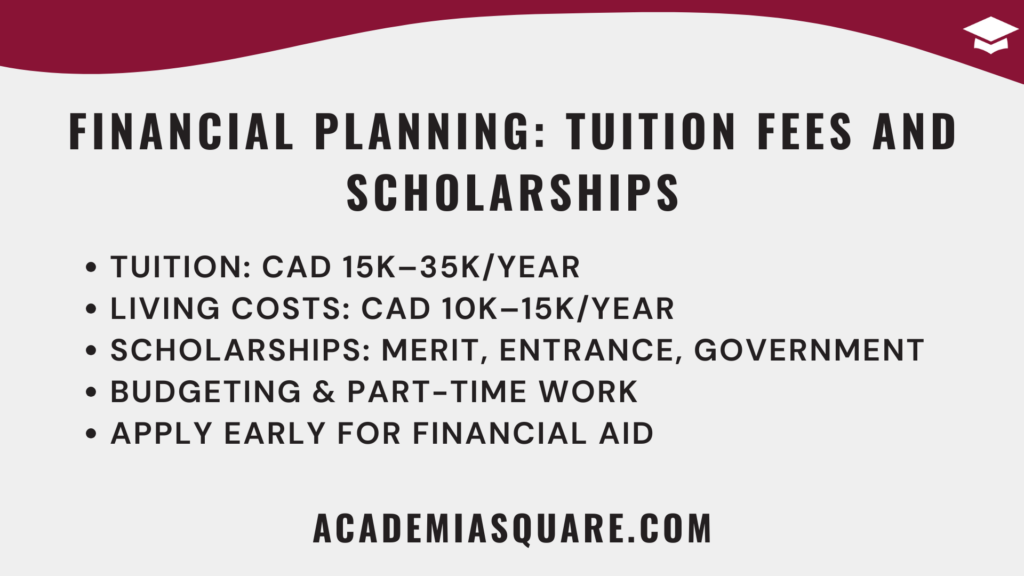
Planning your finances is one of the most critical aspects when you apply to Canadian university as an international student. Canada is generally more affordable than other top study destinations, but tuition and living costs can still be significant. A strong financial plan will not only help you get your study permit but also ensure peace of mind throughout your studies.
Typical Tuition Fees in Canadian Universities
Tuition fees vary widely depending on the program, institution, and province. Here’s an overview:
- Undergraduate programs: CAD 15,000 to CAD 35,000 per year
- Graduate programs: CAD 13,000 to CAD 30,000 per year
- Professional degrees (e.g., MBA, medicine): CAD 30,000 to CAD 60,000+ per year
Public universities tend to be more affordable than private institutions, and tuition is usually higher for international students than domestic ones.
Cost of Living in Canada
Besides tuition, you must budget for accommodation, food, transportation, health insurance, and personal expenses. Estimated monthly living costs:
- Housing: CAD 500–1,200 (depending on city and type)
- Food and groceries: CAD 300–500
- Transport and internet: CAD 100–200
- Health insurance: CAD 600–900 per year (varies by province)
You’ll need to demonstrate access to around CAD 10,000 per year (excluding tuition) to meet study permit requirements.
Scholarships and Financial Aid
Many Canadian universities offer merit-based scholarships and entrance awards for international students. Some options include:
- Vanier Canada Graduate Scholarships – For doctoral students
- Lester B. Pearson International Scholarship – Offered by University of Toronto
- International Entrance Scholarships – Offered by many public universities
Check each university’s financial aid page for eligibility criteria and deadlines. Apply early—many scholarships are awarded automatically but some require separate applications.
Tips for Managing Your Budget
- Create a monthly budget and track all expenses
- Use student discounts for transit, food, and entertainment
- Apply for part-time jobs or work-study programs (if eligible)
Proper financial planning will allow you to focus on your academic and social experience without financial stress.
Accommodation and Living in Canada
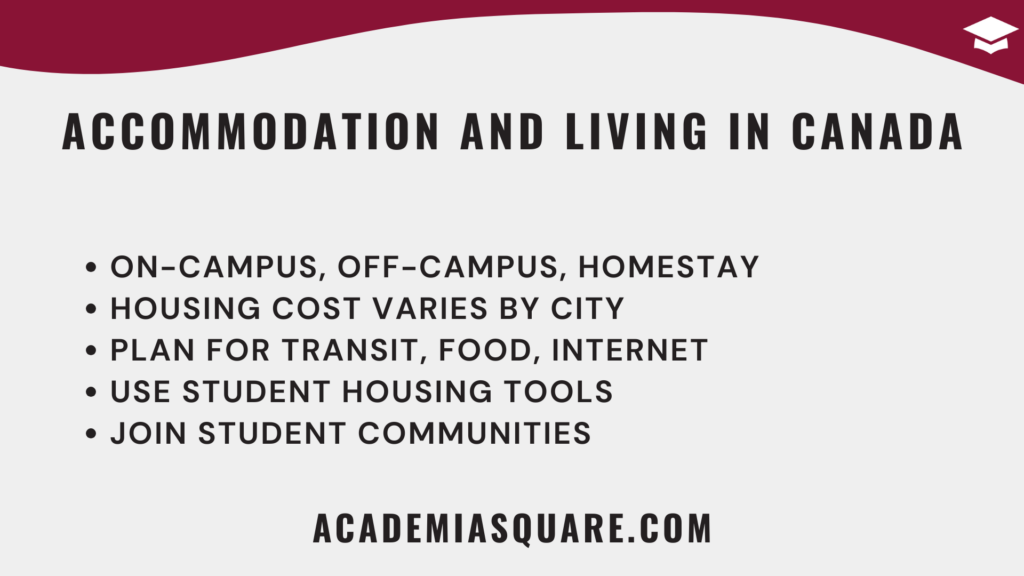
Settling into a new country involves more than just academics. For international students, finding suitable accommodation in Canada is one of the most critical early decisions. Where you live can significantly impact your comfort, safety, and study experience. This chapter explores the options and considerations for living in Canada as an international student.
Types of Student Accommodation in Canada
There are several accommodation options available to international students, each with its own pros and cons. Understanding these will help you make the best decision for your lifestyle and budget:
- On-campus housing: Dormitories or residence halls managed by the university; often include meal plans and utilities.
- Off-campus rental: Apartments, rooms, or houses rented independently or shared with other students.
- Homestay programs: Live with a Canadian host family; ideal for language and cultural immersion.
Most universities offer on-campus housing to first-year students and assist in finding off-campus options for others.
Cost of Accommodation
Housing costs vary by city and type of accommodation. Here’s a general estimate:
- On-campus: CAD 700–1,200/month (includes utilities and sometimes meals)
- Off-campus: CAD 500–1,500/month (plus utilities, internet, etc.)
- Homestay: CAD 750–1,000/month (includes meals and utilities)
Urban areas like Toronto and Vancouver tend to be more expensive, while smaller cities are more affordable.
How to Find Housing as an International Student
Universities often provide support through their international student or housing offices. You can also explore these platforms:
- Places4Students
- Rentals.ca
- Facebook groups, Kijiji, and university housing boards
Start your search early, especially if you are arriving for the Fall semester. Competition is high during this time.
Living Essentials and Student Life
Beyond housing, you’ll need to budget and plan for essential living costs and student life activities:
- Furniture and household items (some rentals are unfurnished)
- Public transit passes (often discounted for students)
- Mobile phone and internet plans
- Groceries and personal items
Most cities offer a vibrant student culture with clubs, events, and recreational activities, which help international students integrate and enjoy their time in Canada.
Working While Studying and Post-Graduation Opportunities
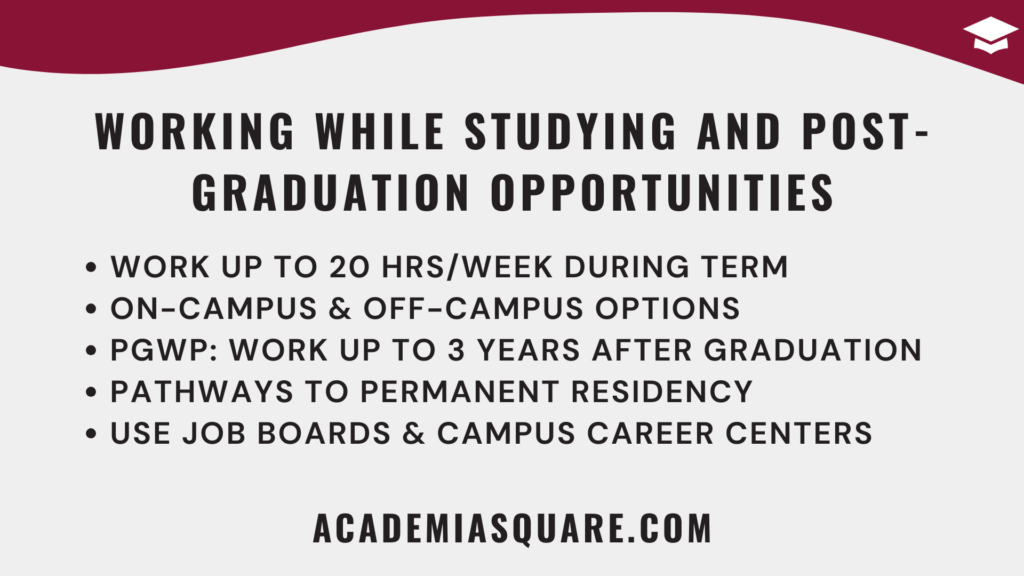
As an international student in Canada, you’re not limited to just academics—you can also gain valuable work experience during and after your studies. This chapter explores employment rights, job opportunities, and post-graduation pathways that can help build your future in Canada.
Working as a Student in Canada
One of the advantages when you apply to Canadian university as an international student is the right to work while studying. You can work:
- On-campus: Unlimited hours, if employed by your university or affiliated institutions
- Off-campus: Up to 20 hours per week during academic sessions and full-time during scheduled breaks
No separate work permit is needed for part-time work if you have a valid study permit and are enrolled full-time in an eligible program.
Finding Part-Time Work
Typical jobs for students include positions in cafés, bookstores, campus libraries, and administrative departments. Online job boards and university career centers are great places to start your search. Canadian job websites include:
Employers often value students who can demonstrate soft skills, flexibility, and a willingness to learn.
Post-Graduation Work Permit (PGWP)
The PGWP allows graduates from eligible Canadian institutions to stay and work in Canada for up to three years. To qualify, you must have completed a program of at least eight months at a Designated Learning Institution (DLI).
The PGWP is an open work permit, meaning you can work for any employer in Canada and gain experience that may count toward permanent residency through programs like Express Entry.
Pathways to Permanent Residency
Canada offers several immigration pathways for international graduates, including:
- Canadian Experience Class (CEC): For those with at least one year of skilled Canadian work experience
- Provincial Nominee Programs (PNPs): Province-specific routes for high-demand professions
- Quebec Experience Program (PEQ): For students who studied in Quebec
Combining education with work experience in Canada not only improves your resume but also increases your chances of making Canada your permanent home.
Common Challenges and How to Overcome Them
Studying abroad is exciting, but it’s not without challenges. From culture shock to academic pressure, international students face a range of difficulties. In this chapter, we address the most common issues and provide practical solutions to help you thrive while studying in Canada.
Culture Shock and Adjustment
Moving to a new country means adapting to new social norms, food, language, and even climate. Culture shock is common, especially during the first few months. Symptoms include homesickness, frustration, and loneliness.
How to cope:
- Stay connected to your culture through food, language, or local communities
- Join campus clubs and events to meet new people
- Give yourself time—it’s okay to feel out of place initially
Academic Expectations and Pressure
Canadian universities emphasize independent learning, critical thinking, and class participation. You may be surprised by the amount of reading and research expected outside of class.
How to succeed:
- Use academic support centers for tutoring and writing help
- Talk to professors during office hours if you’re struggling
- Practice time management and stay organized
Financial and Work-Study Balance
Balancing part-time work and full-time studies can be tough. Some students may feel financial pressure or find it difficult to manage their time effectively.
How to manage:
- Set a monthly budget and stick to it
- Look for campus jobs with flexible schedules
- Apply for bursaries and emergency funds when needed
Homesickness and Mental Health
Many students experience homesickness or emotional challenges. This is normal and treatable. Universities in Canada usually provide free mental health services, including counseling and workshops.
Don’t hesitate to seek help—taking care of your mental health is just as important as your academic success.
By understanding these challenges and preparing for them, you’ll be better equipped to enjoy your Canadian education experience to the fullest.
Resources and Support Services for International Students
One of the major advantages when you apply to Canadian university as an international student is the strong support system most institutions offer. Adjusting to a new country and academic environment is challenging, but Canadian universities are well-equipped to help you succeed, both academically and personally.
University Support Services
Nearly all Canadian universities and colleges offer dedicated services for international students. These services often include:
- International student offices: Your go-to place for help with immigration, study permits, and campus life
- Academic advising: Helps you select courses and understand program requirements
- Career services: Resume writing, interview coaching, and job search support
- Language assistance: ESL or FSL programs to help you improve your English or French
These services are usually free and available throughout your study period, though it’s a good idea to book appointments early during peak times like the beginning of the semester.
Student Health and Wellness
Mental and physical well-being are essential for academic success. Most institutions offer:
- On-campus health clinics
- Counseling and psychological services
- Health insurance plans for international students (mandatory in most provinces)
Some provinces, like British Columbia and Alberta, allow international students to register for provincial health care after a waiting period, while others offer university-specific plans.
Social and Cultural Integration Support
Making new friends and integrating into Canadian society is easier when you join:
- Clubs and societies (academic, cultural, sports)
- Peer mentorship programs
- Orientation week activities
Getting involved helps you develop soft skills, improve your language abilities, and feel more at home in your new environment.
External Resources
In addition to university-provided help, organizations such as the Canadian Bureau for International Education (CBIE) and EduCanada provide extensive resources online for international students.
Support is always within reach—you just need to take the first step and ask.
Applying to Canadian Universities as an American Student
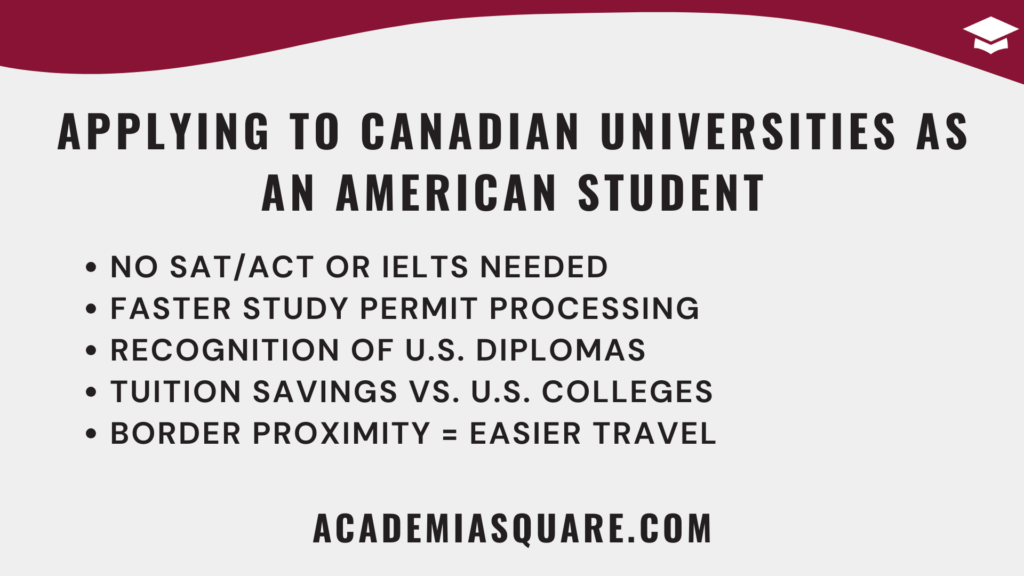
While much of the application process is similar for all international students, American students enjoy a few distinct advantages when applying to Canadian universities. This chapter explores what’s unique for U.S. citizens and how they can leverage these benefits.
Why Americans Are Choosing Canada
In recent years, thousands of American students have turned to Canada for higher education. The appeal includes:
- Lower tuition: Canadian tuition can be 30–60% cheaper than many U.S. universities
- No SAT/ACT: Many Canadian universities do not require standardized test scores
- Global reputation: Degrees from top Canadian institutions are widely respected
- Proximity and ease of travel: Canada is just a short flight or drive away for most Americans
Many institutions actively recruit from the U.S. and have special teams or liaisons to support American applicants.
Application Particularities for U.S. Students
Here’s what sets the American application experience apart:
- Academic equivalency: U.S. high school diplomas are widely accepted; AP and IB courses may earn you credit
- English proficiency waivers: Most schools exempt American applicants from submitting IELTS/TOEFL
- Streamlined documentation: You typically don’t need document translations or credential evaluations
Some institutions even offer tuition at rates closer to domestic fees for U.S. students, especially in border provinces like Ontario and British Columbia.
Study Permits and Border Advantages
Though you’ll still need a study permit for programs longer than six months, Americans benefit from simplified processes:
- No biometrics required (in most cases)
- Faster processing times compared to many other countries
- Study permit approval at the port of entry if all documents are in order
This makes the transition smoother and more accessible compared to applicants from other parts of the world.
For Americans looking for a high-quality education, an inclusive culture, and a globally recognized degree at a reasonable cost, Canada is a compelling and increasingly popular choice.
Conclusion: Embarking on Your Canadian Education Journey
Deciding to apply to Canadian university as an international student is more than just an academic move—it’s a commitment to growth, global perspective, and future opportunity. Canada offers a welcoming, inclusive, and high-quality environment for students from all over the world.
Whether you’re drawn by academic excellence, post-graduation pathways, or the cultural experience, Canada stands out as a top destination for international education. By understanding each step of the journey—from choosing a program to applying for a study permit—you equip yourself with the tools to succeed.
Use this guide as your roadmap, and remember: the effort you invest now will shape your future for years to come. Your Canadian education journey starts with a single, well-informed step.
FAQs – How to Apply to Canadian University as an International Student
What are the basic admission requirements for international students applying to Canadian universities?
International students typically need a high school diploma or equivalent, proof of language proficiency (usually IELTS or TOEFL), academic transcripts, and a valid passport. Some programs may require letters of recommendation, personal statements, or portfolios. According to Universities Canada, over 96% of institutions require language proficiency proof.
Do I need a study permit to attend a Canadian university?
Yes, if your program is longer than six months, a study permit is required. It is issued by Immigration, Refugees and Citizenship Canada (IRCC) and must be approved before arrival. IRCC data shows that over 800,000 international students held active study permits in 2023.
How much does it cost to study in Canada as an international student?
Tuition fees vary by program and institution, generally ranging from CAD 15,000 to CAD 35,000 per year. According to Statistics Canada (2023), the average tuition for international undergraduates is CAD 33,623. Living expenses add approximately CAD 10,000 to CAD 15,000 annually.
Can international students work while studying in Canada?
Yes, international students with valid study permits can work up to 20 hours per week during academic sessions and full-time during scheduled breaks. This policy supports financial independence and career development, as supported by Canadian Bureau for International Education studies.
What is the Post-Graduation Work Permit (PGWP) in Canada?
The PGWP allows graduates of eligible Canadian institutions to work in Canada for up to three years after completing their program. It is an open work permit and can lead to permanent residency under programs like the Canadian Experience Class.
What language tests are accepted by Canadian universities?
IELTS and TOEFL are the most widely accepted English proficiency tests. Some universities also accept CAEL, PTE, and Duolingo English Test. For French-language institutions, TEF or TCF is commonly required. Open data from IRCC shows that IELTS is accepted by over 95% of Canadian post-secondary institutions.
When should I apply to Canadian universities?
Most applications open in the fall (October–December) for programs starting the following September. Deadlines typically range from January to March. Applying early ensures time for permit processing and scholarship opportunities, as recommended by EduCanada.
Do Canadian universities offer scholarships to international students?
Yes, many universities offer entrance scholarships, merit-based awards, and need-based financial aid. Scholarships such as the Lester B. Pearson International Scholarship at the University of Toronto are highly competitive. According to CBIE, over 25% of international students receive some form of financial aid.
Can I stay in Canada after graduation?
Yes, through the PGWP and immigration pathways like Express Entry and Provincial Nominee Programs. Over 60% of international students transition to permanent residency within 10 years, as reported by Statistics Canada in a 2022 study.
Is healthcare free for international students in Canada?
Healthcare is not universally free for international students. Some provinces like British Columbia and Alberta offer public healthcare after a waiting period, while others require private insurance. Most universities offer health plans to ensure adequate coverage.
What are the advantages for American students applying to Canadian universities?
American students benefit from tuition savings, no need for IELTS/TOEFL, academic system compatibility, and easier visa processes. Many universities offer streamlined applications and scholarships for U.S. citizens, with no translation or equivalency requirements for diplomas.
How can Mexican students apply to study in Canada?
Mexican students follow the same process as other international students: choose a DLI, meet academic and language requirements, apply for admission, and then submit a study permit application. Under the Canada–Mexico Agreement, visa processing times may be faster, and many Canadian institutions have Spanish-language admissions support.
What support is available for international students once they arrive in Canada?
Canadian universities offer orientation programs, peer mentoring, academic support, and international student advisors. Studies from the Canadian Journal of Higher Education show that these services are crucial for helping students adjust and succeed.
Are there co-op and internship opportunities for international students in Canada?
Yes, many programs offer co-op and internship options integrated into the curriculum. These work-integrated learning opportunities provide valuable experience and improve post-graduation employment prospects. According to CEWIL Canada, students in co-op programs are significantly more likely to receive job offers before graduation.
Sources and Recommended Reading on Applying to Canadian Universities as an International Student
- Statistics Canada. “Canadian postsecondary enrolments and graduates, 2022/2023.”
- Canadian Bureau for International Education. “International Students in Canada Infographic.”
- Universities Canada. “What you need to know to study in Canada as an international student.”
- Council of Ministers of Education, Canada. “Education in Canada: An Overview.”
- Government of Canada. “Study in Canada as an international student.”
- Immigration, Refugees and Citizenship Canada. “Application to study in Canada – Study permits.”
- University of British Columbia. “Welcome to Canada? : experiences and views of international graduate students.”
- Alberta Law Review. “Unearthing the ‘Established Citizen’: International Students’ Inaccess to Justice.”
- Academia Square. “How to Choose a University: Guide for Students and Parents.”
- Academia Square. “How to Apply to American University as an International Student.”


